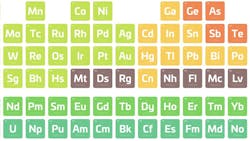Minor minerals play a major role in health
Contributing authors:
Annelise Collins, MBA, RD US
Ellen R. Guritzky, MJS, RDH, FADHA
Alpa Shah, MS, RDN US
In the vast tapestry of nutrients that our bodies require, minor minerals are often overshadowed by their more prominent (major) counterparts. Despite their seemingly small role, these trace elements are pivotal in maintaining optimal health.
Minor minerals are essential nutrients required in minuscule quantities. From supporting enzymatic processes to fortifying immune defenses, these minerals serve as the unsung heroes of physiological functions.
Iron is necessary for the body
Iron is abundant in the body, with the highest concentration in the form of a heme molecule. Dietary iron is absorbed by the gut when blood iron levels are low, and absorption is downregulated as levels increase.
Iron is necessary for many enzymes through the body, as well as DNA, RNA, and collagen synthesis.1 Most notably, the iron in heme bonds to a globin protein to form hemoglobin, which transports oxygen through the blood to the rest of the body.
Low iron levels, or iron deficiency, can lead to anemia. Oral manifestations can be seen as angular cheilitis or a smooth tongue.1 Foods high in iron are readily available, such as animal products, vegetables, legumes, nuts, and fruits. Iron deficiency is not uncommon in the US, with a slightly higher prevalence in young women.2
Fluoride vital for bone health
Fluorine, or fluoride, the ion of fluorine, plays a vital role in the skeletal system to help form bones and teeth. Fluoride in crystal structure can become part of the appetite structure in bones and teeth. It inhibits initial demineralization and aids in remineralization of enamel.3
The controversy surrounding fluoride comes from the delicate balance between a tolerable dose and a toxic dose. One study estimated that the dosage of systemic toxicity was around 5mg/kg.4 Systemic toxicity can cause abdominal pain, nausea, and even death, and is generally related to accidental consumption.
Chronic excess intake of fluoride can lead to skeletal fluorosis and result in joint pain and neurological symptoms.1,5 However, the tolerable upper intake limit of daily fluoride is 10 mg per day, which is far above the average daily intake in the US.3
Fluoride varnish total dosage is around 2.5 mg but varies by brand, and most uptake occurs within the first four to six hours after application. Uptake can depend on many variables, such as the type of varnish applied or the health of the tooth enamel.6
Zinc for immune function
Zinc is necessary for all classes of enzymes. It plays a crucial role in immune function, wound healing, and protein and DNA synthesis.1 Zinc and copper work together to form a protein superoxide dismutase, an antioxidant that breaks down superoxide, the reactive oxygen species that causes cellular damage.1 Superoxide is broken down into oxygen and hydrogen peroxide. Zinc may act as an antioxidant in other ways, but more research is needed to investigate this further.1
Zinc is present in enamel, saliva, and plaque and is used in many kinds of toothpaste and mouthwashes to reduce plaque and calculus formation and reduce oral odor.1 Zinc deficiency or disruption contributes to a change in or a lack of the smell and taste senses.1 Zinc is high in foods such as meats, dairy, and fish.
Copper for energy production
Copper is absorbed in the gut and many metabolic enzymes rely on copper to function properly. Copper is essential in energy production, strengthening epithelial and connective tissues, myelin production, and for the thyroid hormone thyroxine.1
Copper may act as an antioxidant as it can scavenge free radicals and works alongside zinc to detoxify superoxides in the body.1 Interestingly, zinc and copper have an antagonistic relationship, meaning that zinc interferes with the absorption of copper.1
Copper is important for growing children and a deficiency of copper during active growth periods can lead to fragile bones, teeth, and periodontium.1 As a person ages, a deficiency of copper may contribute to osteoporosis and joint pain, as many enzymes require copper to remodel and retain bone. Copper is readily available in a variety of foods such as whole grains, legumes, potatoes, greens, and fruits.
Chromium for glucose tolerance
Chromium is an important cofactor of the glucose tolerance factor (GTF), which increases the efficiency of insulin to increase glucose uptake by the muscles and other organs.1 When chromium is depleted or is not present, GTF is also depleted, and insulin is less effective; therefore, blood glucose remains higher for longer periods.1 Chromium deficiency is rare because chromium is present in meat products, whole grains, and many spices.
Iodine for growth
Iodine plays an important role during stages of growth and development. It is an essential part of the T4 and T3 hormones produced by the thyroid and plays a role in the functioning of the parathyroid glands.1 While iodine deficiency is rare in the US, other parts of the world are more commonly affected, and iodized salt has been used to offset this deficiency. Iodine deficiency often looks like hypothyroidism due to the decreased secretion of thyroid hormones and may appear as thickened lips and macroglossia.1
Selenium to prevent inflammation
Selenium may help the body deal with inflammation and is a vital part of many enzymes.1 Selenium salts are important for many cellular functions and may impact immune responses by changing cytokines or their receptors, which provide greater resistance to oxidative stress.1 Selenium works with other nutrients, such as vitamin E in glutathione peroxidase, to help protect the body from oxidative stresses.1
A single study from 2013 demonstrated that selenium may help patients suffering from oral mucositis due to chemotherapy.7 This may be due to the anti-inflammatory and antioxidant effects of selenium that may reduce the longevity and severity of oral mucositis. It could also be that the supplementation of selenium may induce a cytoprotective effect on the cells of the oral mucosa, but further research is needed.
Minor minerals, which are often overlooked, play essential roles in maintaining optimal and oral health. These trace minerals are critical for various physiological functions, including enzymatic processes, immune system support, and overall metabolic regulation.
Dental hygienists are well positioned to identify patients who may be lacking in minerals. We should share our understanding of the roles of these trace elements and their vital contributions to health, which illustrate that even in small amounts, minor minerals can have a profound and lasting impact on patients’ well-being.
Editor's note: This article appeared in the July 2025 print edition of RDH magazine. Dental hygienists in North America are eligible for a complimentary print subscription. Sign up here.
References
- Bhattacharya PT, Misra SR, Hussain M. Nutritional aspects of essential trace elements in oral health and disease: an extensive review. Scientifica. 2016;2016:1-12. doi:10.1155/2016/5464373
- Tawfik YMK, Billingsley H, Bhatt AS, et al. Absolute and functional iron deficiency in the US, 2017-2020. JAMA Netw Open. 2024;7(9):e2433126. doi:10.1001/jamanetworkopen.2024.33126
- Office of dietary supplements – fluoride. NIH Office of Dietary Supplements. Accessed April 11, 2025. https://ods.od.nih.gov/factsheets/fluoride-healthprofessional/
- Ciosek Ż, Kot K, Kosik-Bogacka D, Łanocha-Arendarczyk N, Rotter I. The effects of calcium, magnesium, phosphorus, fluoride, and lead on bone tissue. Biomolecules. 2021;11(4):506. doi:10.3390/biom11040506
- Whitford GM. Acute toxicity of ingested fluoride. Monogr Oral Sci. 2011;22:66-80. doi:10.1159/000325146
- Schemehorn BR, Wood GD, McHale W, Winston AE. Comparison of fluoride uptake into tooth enamel from two fluoride varnishes containing different calcium phosphate sources. J Clin Dent. 2011;22(2):51-54.
- Colella G, Boschetti CE, Vitagliano R, et al. Interventions for the prevention of oral mucositis in patients receiving cancer treatment: evidence from randomised controlled trials. Curr Oncol. 2023;30(1):967-980. doi:10.3390/curroncol30010074
About the Author
Breezy Briana Bonney, MS, BSDH, RDH
Breezy Briana Bonney, MS, BSDH, RDH, is a dental hygienist with a bachelor’s degree in dental hygiene from Texas A&M College of Dentistry and a master's degree in medical nutrition from Arizona State University. She is passionate about educating patients and clinicians on dental health, the oral-systemic link, and nutrition. When Breezy is not working, she enjoys training for her next half marathon or working out at OrangeTheory Fitness with her husband.

